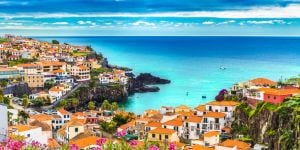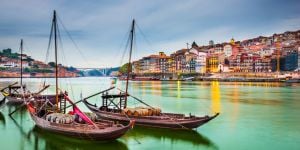
Before embarking on a journey to a new country and completely uprooting yourself towards a new life and a new geographical and cultural location, it's wise to understand the nuances behind diversity and inclusion, as well as better understand the political scene awaiting you. With that in mind, this brief guide will explore different aspects of Portugal's recent data and statistics on safety, diversity, inclusion and the current political parties and movements and their trends. Remember that diversity and inclusion are ongoing discussions, and it's essential to involve a wide range of perspectives and voices in these conversations.
Safety in Portugal
First things first, Portugal is one of the safest countries to live in. Year after year, statistics show Portugal as a safe country, with low criminality rates and low violence levels. Even in major cities (where crime tends to be more evident), you can expect a fairly safe environment, and you might find that many locals are comfortable taking night walks (something that may feel very strange and unusual depending on where you are these days).
According to the 2025 Global Peace Index, Portugal is the 7th safest country in the world. Official stats disclosed by the Home Safety Annual Report (Relatório Anual de Segurança Interna – RASI - only available in PT) recorded a 4.6% drop in crime reports in 2024, compared to 2023. Nonetheless, violent crime went up by 2.6%. Still, Portugal remains one of the safest countries in Europe (and the world), although crime perception among the population is getting higher and higher. This can be attributed to the over-sensationalism of news in papers, TV reports, social media and politics.
As of now, no official data seems to point to the safety situation in Portugal getting any worse. Portugal still has a rather low crime rate, and violent crime is very rare.
Racism in Portugal
According to the World Population Review, Portugal ranked 17th (2024) among the least racist countries in the world. This means you shouldn't expect minorities to be targeted, and you shouldn't expect to witness racism or violent crimes in general. Portugal has been consistently ranked as a safe place to live, regardless of ethnicity.
That being said, one must mention the country's historical background of colonialism, which is still somewhat present in the country's narrative and shared identity. Furthermore, and much like the rest of Europe, the far-right has been growing steadily in Portugal, currently representing the second largest party in the Parliament. This party focuses much of its political discourse on anti-immigration rhetoric, creating a sense of tension between natives and outsiders. Perhaps feeling vindicated by election results, nationalist and neo-Nazi groups (such as Grupo 1143 or Reconquista) have been organizing marches and rallies across different Portuguese cities.
Ethnic and cultural diversity in Portugal
It's important to mention that Portugal tends to be a fairly homogenous country when it comes to ethnic and cultural background. Historically, Portugal has been a country of mostly emigrants and not immigrants. However, in recent years, the country has experienced increased cultural diversity due to immigration, mainly from former Portuguese colonies and other nations with similar economic constraints, such as India, Nepal or Pakistan. Sadly, these communities are often targeted by anti-immigration speech.
In recent years, the country has also been receiving a lot of attention from the expat community, and Lisbon has become a very well-known hub for this specific demographic.
Religious diversity in Portugal
The main thing you should know is that Portugal doesn't have any state religion or official religion, and all people are free to practice whichever ideology they support.
That being said, Catholicism has been a big part of the country's history, and according to the 2021 census, around 80% of the population identifies as Christian (but many admit that ,despite having been baptized as infants, they don't actually practice any rituals or religion-related practices aside from the major yearly celebrations such as Christmas or Easter).
Since 1974 (when the country experienced the Carnation Revolution), the country has changed drastically, and freedom to practice all religions has been proclaimed.
Here is a list of a few religions you'll be able to find in Portugal:
- Catholicism and Christianity;
- Judaism;
- Islam;
- Hinduism & Sikhism;
- Atheism;
- Agnosticism.
The country's law declares that all people have a right to practice religious freedom with no discrimination. However, the most important data you should know is that the law protects religious freedom, even if issues sometimes arise within the population. Especially for worshippers of Islam and Sikhism, discrimination is on the rise in Portugal, with lots of Portuguese people expressing their wishes against the construction of new mosques in the country.
Be that as it may, and though the country is a lot less tolerant than it was just 3 or 4 years ago, Portugal is still considered a safe place to live regardless of ethnicity or religious background.
Gender and LGBTQ+ inclusion in Portugal
Since 2004, the Constitution of Portugal has prohibited any form of discrimination based on sexual orientation. Portugal has become, ever since, one of the only countries in the world to establish in its constitution a ban on discrimination based on sexual orientation.
Same-sex marriage in Portugal has been legalized since 2010, and same-sex unions have been recognized by the state since the end of 1999/early 2000s. The country's law protects people from discrimination, and it extends to different areas such as visa issues, inheritance, and all other legal matters.
Once again, the rise of the far-right has brought in a spike in discrimination against the community, with more ultraconservative voices expressing their contempt towards marches, parades or any other demonstration they see as promoting “gender ideology”. This is especially true for trans people, by far the most discriminated group in the community.
Inclusion among people with disabilities in Portugal
Like many other countries, people with disabilities in Portugal face a wide range of challenges, and while significant progress has been made in recent years to improve inclusivity and accessibility, there's still much to be done.
One of the most prominent challenges for individuals with disabilities in Portugal is the limited accessibility to public spaces, transportation and buildings, since many cities and towns lack proper infrastructure, making it difficult for people with mobility issues to move around independently.
Moreover, access to quality education can be a significant challenge for individuals with learning/mental disabilities in Portugal, as students with disabilities often face a lack of appropriate support. The same goes for employment since finding and maintaining a job can be a significant challenge due to discrimination in the workplace. As proof/result of this stigmatization and social isolation, Portugal has a high unemployment rate among people with disabilities compared to the general population.
That being said, Portugal has established a legal document to protect the rights of people with disabilities through the National Strategy for Inclusion of Persons with Disabilities (in PT only).
As part of the document, Portugal has made efforts to promote inclusive education, highlighting the right of students with disabilities to access regular education and receive necessary support. Special education support, though usually inefficient, is nonetheless provided to ensure that students with disabilities can go to regular schools. The same goes for accessibility, as local authorities have been working to improve access to public spaces, transportation and buildings. In fact, and from a legal standpoint, all new construction projects are required to obey accessibility guidelines.
Last but certainly not least, Portugal has implemented programs and incentives to encourage the hiring of individuals with disabilities in order to address employment discrimination, such as Valor T. As part of these policies, employers can benefit from financial incentives and tax breaks for hiring people with disabilities. Plus, the government has established quotas for companies with more than 75 workers. As part of the current legislation, companies that employ between 75 and 249 workers must have at least 1% of their workforce composed of people with a proven disability incapacity of at least 60% (although the current administration is trying to pass a bill to lower the incapacity level to just 30%, making it easier for companies to reach that quota). That threshold goes up to 2% for companies with at least 250 employees.
The political scene in Portugal
In recent years, the political party CHEGA (a far-right party showcasing a vast array of xenophobic and discriminatory intentions and values) has gained popularity amongst the unhappy and disappointed fringes of society, leading it to become the second main political party in the country. As of 2025, their political influence is starting to have an impact on the country's laws, structure and ways of living, showcasing a generalized discontentment experienced by the majority of the population—one that is being harnessed to feed the xenophobic narrative/agenda.
The world is changing rapidly, at a faster pace than expected, so we do recommend keeping an eye out for current and updated trends within the political scene and fact-checking the available data using multiple sources.
Overall, it seems that Portugal is still a very accepting and friendly country and consistently safe and violence-free for people from all walks of life, regardless of ethnicity, religious background, or sexuality. Unfortunately, if the country keeps going down the same road, things may slowly (but surely) change.
We do our best to provide accurate and up to date information. However, if you have noticed any inaccuracies in this article, please let us know in the comments section below.








